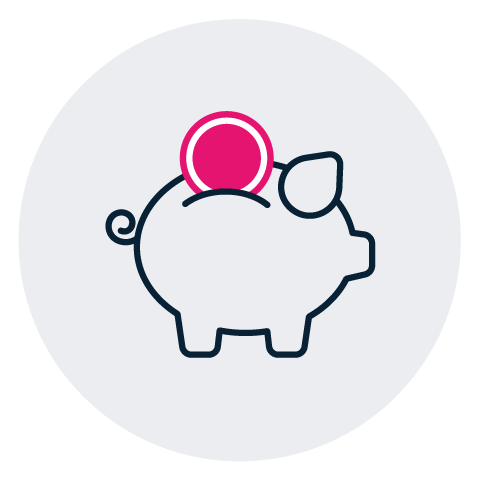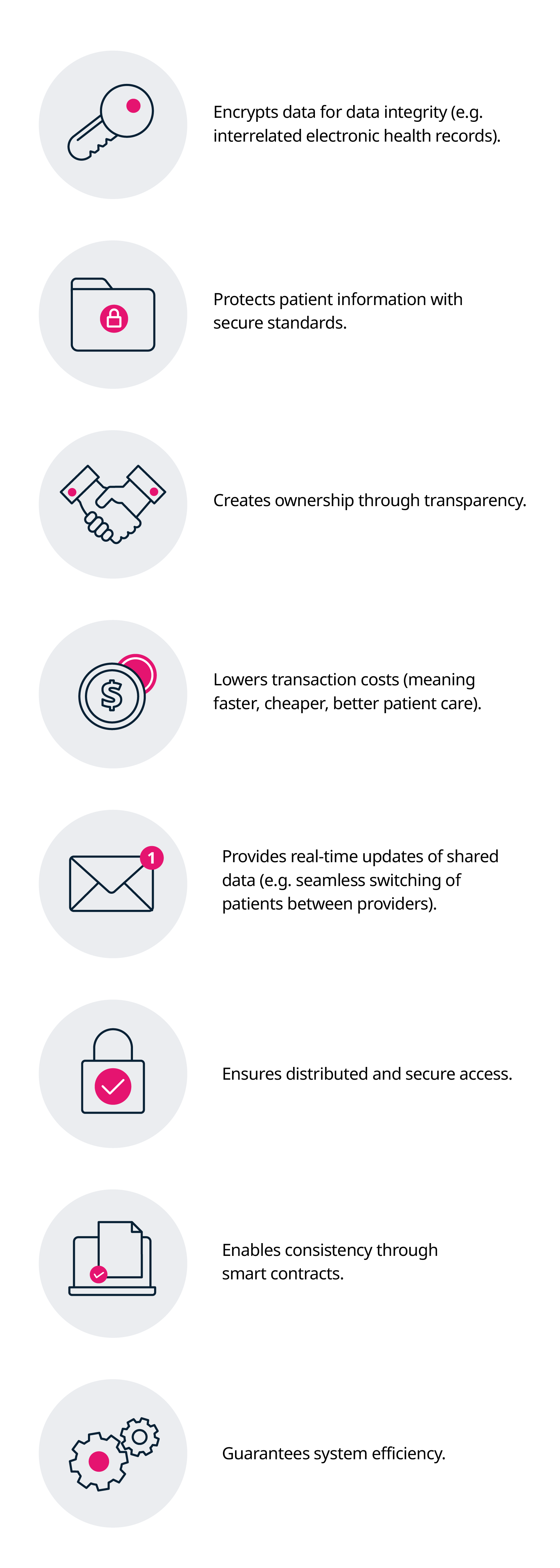A Guide to Blockchain Applications in Healthcare
With the ability to reduce costs, protect patient data, and improve patient and health workers’ overall experience, blockchain is a powerful solution to various persistent pain points in the healthcare industry.
Blockchain technology has a wide range of applications and uses in this sector, from facilitating the secure transfer of patient medical records and managing the medicine supply chain to the outbreak of diseases and helping healthcare researchers unlock genetic code.1
Many healthcare organizations within a region, community, or system mobilize healthcare information electronically. This is known as a health information exchange, or an HIE. Let’s explore the essential facts around enhancing and improving your HIE with blockchain technology.
The basics of blockchain
Blockchain is a distributed, decentralized, public ledger that stretches across a computer network. There are six general, but well-defined steps in any blockchain: 2

How blockchain can optimize healthcare
Blockchain technology can be transformative in healthcare. It can help achieve:3
- Security
- Privacy
- The integration of health data
Capitalizing on this technology can connect fragmented systems to generate insights and assess the value of care more effectively. In the long term, a nationwide blockchain network for electronic medical records may improve efficiencies and support better health outcomes for patients.
Blockchain offers the opportunity for a new technological model in an HIE that makes electronic medical records more efficient and secure. It can also reduce or eliminate the friction and costs of current intermediaries.
Types of HIE health data
HIE data is used to improve the quality of healthcare, prevent errors, and increase the efficiency of administration. It includes:4
- Patient health information
- Electronic health records
- Data collected from Internet of Things (IoT) devices or monitoring systems
- Medical insurance claims
- E-prescribing
- Electronic dental records
- Secure messaging
Data breaches hit the healthcare industry hardest
According to the 2021 data breach report, the healthcare segment continues to be targeted by cyber criminals, having experienced more breaches than any other industry sector in 2021.5
In the first six months of 2021, 238 healthcare data breaches were reported.
In a forecast of healthcare and blockchain trends up until 2025, it was found that blockchain can reduce $100 billion in annual costs for data breaches, IT, operations, support functions, personnel, fraud, and insurance.6

Blockchain offers a solution to cyberattacks by decentralizing the domain name system (DNS) entries. By applying decentralized solutions, blockchain removes the vulnerable single points exploited by hackers.
Eight benefits of blockchain in healthcare
Before you invest in blockchain, it’s critical to assess the risks versus the rewards of introducing the technology into a healthcare system. Let’s start with the benefits:7

Six barriers to blockchain in healthcare
Introducing blockchain innovations into this industry isn’t without its challenges. Be aware of these commonly encountered limitations: 8

Seven healthcare companies leading the way in HIE and blockchain
Take a look at these seven companies, which are pioneering diverse blockchain applications in healthcare today.

Look beyond blockchain technology in healthcare
To appreciate blockchain’s various applications in healthcare, it’s important to understand how this type of distributed ledger technology works, and how it can be applied practically to the broader healthcare ecosystem, whether improving processes or enabling employees to realize their professional goals.
While blockchain currently helps healthcare professionals to conveniently maintain extensive patient records, the advantages must be considered within the scope of pervasive challenges.
It’s clear that blockchain has started to disrupt, innovate, and reimagine healthcare and the world of work, and will continue to do so in the future. With any technology – and particularly blockchain – it’s critical to keep up to date with the latest developments.
The Blockchain and Digital Currency: The Future of Money online short course from the University of Cape Town (UCT) will provide you with an in-depth understanding of how blockchain works, with a focus on crypto assets.
Discover how blockchain will impact the future of finance
- 1 Daley, S. (Dec, 2021). ‘34 Blockchain applications and real-world use cases disrupting the status quo’. Retrieved from Builtin.
- 2 Hayes, A. (Feb, 2022). ‘Blockchain explained’. Retrieved from Investopedia.
- 3 Mosey, J. (Oct, 2021). ‘The future of blockchain in healthcare’. Retrieved from Forbes.
- 4 Haleem, A., et al. (2021). ‘Blockchain technology applications in healthcare: An overview’. Retrieved from International Journal of Intelligent Networks.
- 5 Alder, S. (Aug, 2021). ‘Healthcare industry has highest number of reported data breaches in 2021’. Retrieved from HIPAA Journal.
- 6 (2018). ‘Global Blockchain in Healthcare Market: Focus on Industry Analysis and Opportunity Matrix – Analysis and Forecast, 2018–2025’. Retrieved from BIS Research.
- 7 Thomas, L. (Jan, 2021). ‘Blockchain applications in healthcare’. Retrieved from News Medical Life Sciences.
- 8 Oderkirk, J. & Slawomirski, L. (Dec, 2020). ‘Opportunities and challenges of blockchain technologies in health care’. Retrieved from OECD.
- 9 (Nd). ‘About us’. Retrieved from BurstIQ. Accessed February 22, 2022.
- 10 (Nd). ‘Individualized support for a unified circle of care’. Retrieved from WholeCare. Accessed February 22, 2022.
- 11 (Nd). ‘About us’. Retrieved from Nebula Genomics. Accessed February 22, 2022.
- 12 (Nd). ‘About us’. Retrieved from Medicalchain. Accessed February 22, 2022.
- 13 Marr, B. (Nd). ‘35 Amazing real-world examples of how blockchain is changing our world’. Retrieved from Bernard Marr & Co. Accessed February 23, 2022.
- 14 (Nd). ‘The easiest way for users to connect crypto to your app’. Retrieved from Gem. Accessed February 22, 2022.
- 15 Daley, S. (Aug, 2021). ‘34 Blockchain applications and real-world use cases disrupting the status quo’. Retrieved from BuildIn.
- 16 (Mar, 2020). ‘MedRec’. Retrieved from DLT4ALL.
- 17 (Nd). ‘About us’. Retrieved from Patientory. Accessed February 22, 2022.
- 18 (Jun, 2021). ‘Patientory hurdles challenges during pandemic times’. Retrieved from GlobeNewswire.
